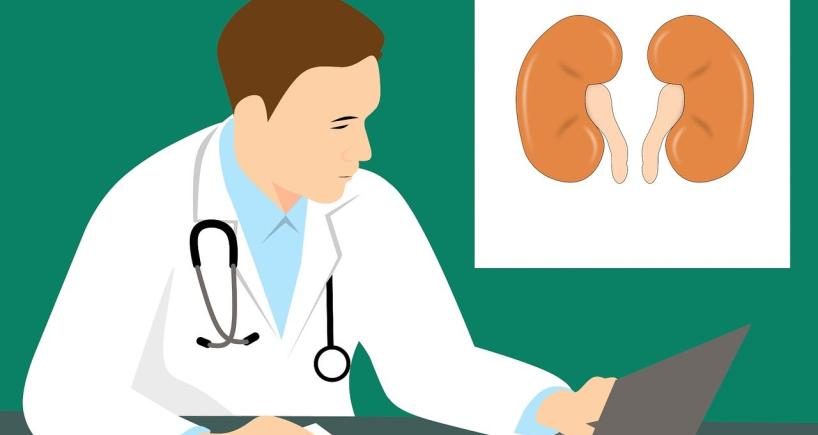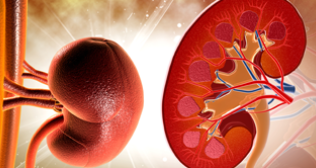
Identifying Key Stages and Symptoms of Chronic Kidney Disease (CKD)
Chronic kidney disease (Also known as CKD as well as chronic renal disease) means that there’s damage to person's kidneys, and they aren’t working as well as they should. Person's kidneys are like a filter in human body — filtering out wastes, toxins, as well as excessive water from person's blood. They also aid with other functions like bone as well as red blood cell health. When person's kidneys commence to lose their function, they can’t purify waste, which means the waste accumulates in person's blood.
Kidney disease is called “chronic” as renal function slowly decreases over period of time. CKD can cause renal failure, which is also called end-stage kidney disease. Not everyone suffering from CKD will develop renal failure, but the ailment will often worsen without treatment. There’s no cure for chronic kidney disease. But there are steps person can take to slow kidney damage. Treatments like dialysis as well as transplantation are options for kidney failure (end-stage kidney disease).
What are the 5 phases of long term kidney disease?
There are five phases of chronic renal disease. The stages are based on how well patient's kidneys are able to filter out waste from patient's blood. Blood and urine tests assess which stage of CKD patient is in.
The stages of renal failure range from very mild (stage 1) to renal failure (stage 5). Healthcare providers assess the stage of patient's renal function as per the glomerular filtration rate (GFR). Patient's GFR is a number based on the quantity of creatinine, a waste product, found in patient's blood.
Stage GFR (ml/min) What it means?
Stage 1 (90 and higher) - Patient's kidneys are functioning well but person have signs of mild renal damage.
Stage 2 60 to 89 - Patient's kidneys are working well, but patient has more signs of mild kidney damage.
Stage 3a 45 to 59 - Patient's kidneys aren’t functioning as well as they should and show mild to moderate damage. This is the most predominant stage. Person may notice symptoms at this stage.
Stage 3b 30 to 44 - Patient's kidneys show moderate damage and don’t work as well as they should. With the relevant treatment, many individuals can stay in this stage and never progress to stage 4.
Stage 4 Around 15 to 29 - Patient have very poor kidney function; patient's kidneys are severely damaged and close to not working.
Stage 5 Less than 15 - Patient's kidneys are very close to failing/have stopped working. Patient may require kidney dialysis or a kidney transplant at this stage.
Signs and symptoms
Many individuals suffering with CKD do not have any manifestations until the more advanced stages and/or complications develop. If symptoms do happen, they may comprise:
- Foamy urine
- Urinating (peeing) more frequently or less often than usual
- Itchy and/or dry skin
- Feeling exhausted
- Feeling pukish
- Loss of appetite
- Weight loss without putting efforts to lose weight
Individual who has more advanced stages of CKD may also notice:
- Difficulty in concentrating
- Numbness or swelling in person's arms, legs, ankles, or feet
- Achy muscles or cramping
- Shortness of breath
- Vomiting
- Trouble sleeping
- Breath smells like ammonia (also described as urine-like or “fishy”)
How is chronic renal disease treated?
There’s no way to heal chronic kidney disease (CKD), but steps can be taken to maintain patient's kidney function, so they work as long as possible. If patient has decreased renal function:
- Patient should make and keep his/her regular healthcare provider/nephrologist (kidney specialist) visits. These providers monitor patient's kidney health.
- Person should manage his/her blood glucose (sugar) if person is suffering from diabetes.
- Avoid taking painkillers as well as other medications that may make person's kidney disease worse.
- Patient should manage his/her blood pressure levels.
- Patient should follow a kidney-friendly diet. Dietary changes may comprise limiting protein, ingesting food items that reduce blood cholesterol levels, and limiting sodium (salt) as well as potassium intake.
- Person should cease smoking.
- Do physical activity/be active on majority days of the week.
- Stay at a weight that’s healthy for an individual.
- Medications for renal disease
- Depending on the cause of patient's kidney disease, you may be prescribed one/more medicines.
Medications patient's nephrologist may prescribe comprise:
- An angiotensin-converting enzyme (ACE) inhibitor/an angiotensin receptor blocker (ARB) to reduce blood pressure.
- Phosphate binder if patient's kidneys can’t remove phosphate.
- A diuretic to aid person's body eliminate extra fluid.
- Medicines to reduce cholesterol levels.
- Erythropoietin to build erythrocytes if person is anaemic.
- Vitamin D as well as calcitriol to prevent bone loss.
In a nutshell, chronic kidney disease (CKD) is when the kidneys have become damaged over period of time (for minimum 90 days) and have a difficult time doing all their important jobs. CKD also increases the chances of other health problems like heart disease as well as stroke. Developing CKD is generally a very slow process with very few symptoms at first. So, CKD is categorised into 5 stages to help guide treatment decisions.
Popular Searches :
Hospitals: Cancer Hospital in Delhi | Best Heart Hospital in Delhi | Hospital in Amritsar | Hospital in Ludhiana | Hospitals in Mohali | Hospital in Faridabad | Hospitals in Gurgaon | Best Hospital in Jaipur | Hospitals in Greater Noida | Hospitals in Noida | Best Kidney Hospital in Kolkata | Best Hospital in Kolkata | Hospitals in Rajajinagar Bangalore | Hospitals in Richmond Road Bangalore | Hospitals in Nagarbhavi Bangalore | Hospital in Kalyan West | Hospitals in Mulund | Best Hospital in India | | Cardiology Hospital in India | Best Cancer Hospital in India | Best Cardiology Hospital in India | Best Oncology Hospital In India | Best Cancer Hospital in Delhi | Best Liver Transplant Hospital in India
Doctors: Dr. Rana Patir | Dr. Rajesh Benny | Dr. Rahul Bhargava | Dr. Jayant Arora | Dr. Anoop Misra | Dr. Manu Tiwari | Dr. Praveer Agarwal | Dr. Arup Ratan Dutta | Dr. Meenakshi Ahuja | Dr. Anoop Jhurani | Dr. Shivaji Basu | Dr. Subhash Jangid | Dr. Atul Mathur | Dr. Gurinder Bedi | Dr. Monika Wadhawan | Dr. Debasis Datta | Dr. Shrinivas Narayan | Dr. Praveen Gupta | Dr. Nitin Jha | Dr. Raghu Nagaraj | Dr. Ashok Seth | Dr. Sandeep Vaishya | Dr. Atul Mishra | Dr. Z S Meharwal | Dr. Ajay Bhalla | Dr. Atul Kumar Mittal | Dr. Arvind Kumar Khurana | Dr. Narayan Hulse | Dr. Samir Parikh | Dr. Amit Javed | Dr. Narayan Banerjee | Dr. Bimlesh Dhar Pandey | Dr. Arghya Chattopadhyay | Dr. G.R. Vijay Kumar | Dr Ashok Gupta | Dr. Gourdas Choudhuri | Dr. Sushrut Singh | Dr. N.C. Krishnamani | Dr. Atampreet Singh | Dr. Vivek Jawali | Dr. Sanjeev Gulati | Dr. Amite Pankaj Aggarwal | Dr. Ajay Kaul | Dr. Sunita Varma | Dr. Manoj Kumar Goel | Dr. R Muralidharan | Dr. Sushmita Roychowdhury | Dr. T.S. MAHANT | Dr. UDIPTA RAY | Dr. Aparna Jaswal | Dr. Ravul Jindal | Dr. Savyasachi Saxena | Dr. Ajay Kumar Kriplani | Dr. Nitesh Rohatgi | Dr. Anupam Jindal |
Specialties: Heart Lung Transplant | Orthopedic | Cardiology Interventional | Obstetrics & Gynaecology | Onco Radiation | Neurosurgery | Interventional Cardiology | Gastroenterologist in Jaipur | Neuro Physician | Gynecologist in Kolkata | Best Neurologist in India | Liver Transfer



















